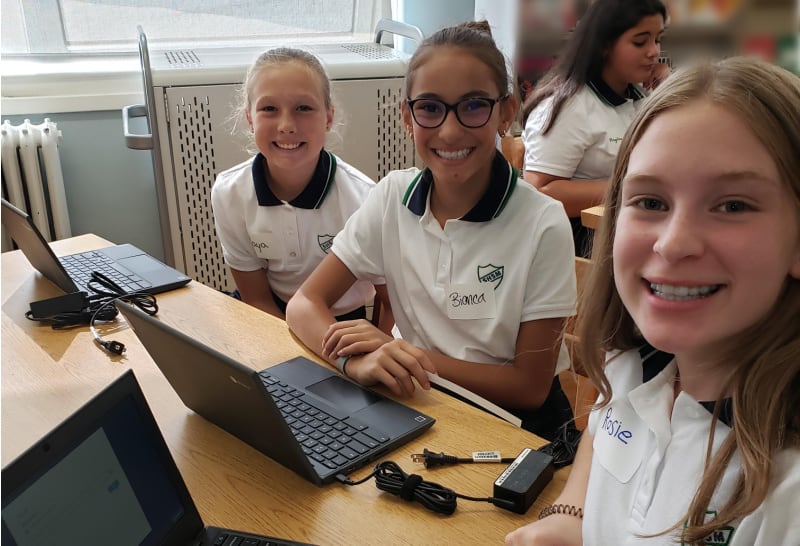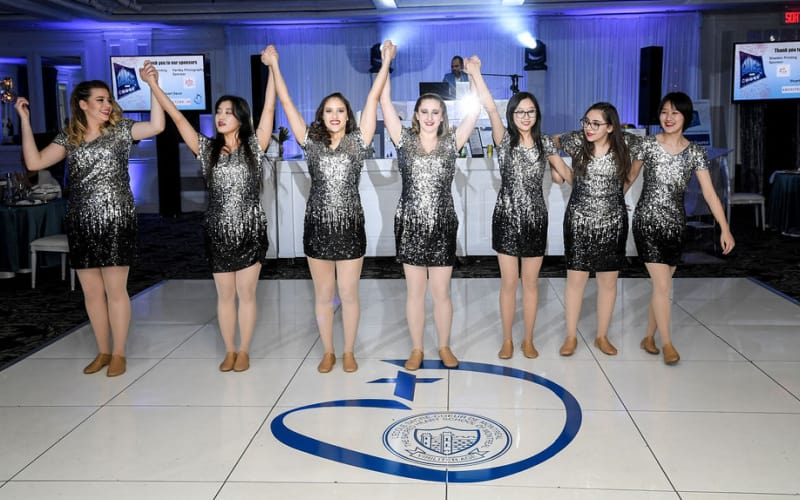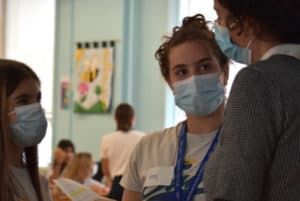Grade 9 (Sec. III)
The English Language Arts course promotes the love of learning by encouraging students to deepen their appreciation of literature and their understanding of language encountered in media texts. Students engage in open and respectful discussion of a wide range of ideas, including major ethical and moral dilemmas faced by humankind. The choice of literature and the topics of discussion and debate encourage intellectual development and a habit of reflection. Emphasis continues to be placed on the fundamentals of language: vocabulary development, grammar and syntax. Different forms of writing, such as monologues, news articles, essays and short stories, are learned and practiced. Oral presentations such as poetry recitation and persuasive speeches continue to be practiced and developed.
This course provides an introductory overview of ethics and morality by focusing on three key frameworks: Utilitarian ethics, Kantian ethics, and Christian existentialism. These frameworks have been impactful in both secular and Christian perspectives.
The course aims to relate these ethical theories to current issues that are important to both modern society and the Christian community.
Students are encouraged to adopt a positive attitude towards language and culture and to acquire a mastery of written and spoken French. They are encouraged to reflect on language and become aware of its role in learning, structuring their thoughts and developing their imagination. They are invited to discover the pleasure of mastering the French language and to understand the cultures it conveys in order to better situate themselves in the linguistic and cultural diversity of the contemporary world.
In high school, students learn to pay increasing attention to the interaction between the various communication elements of a situation and their impact on the meaning of texts. They increase their understanding of the intention behind texts they hear, read or watch, which helps them understand the meaning. They also learn to communicate their message effectively in a framework of authentic, varied and meaningful communication situations.
In high school, students deepen the skills acquired previously, and develop further knowledge of the language, learning in increasingly varied contexts where they must demonstrate increasing autonomy. In addition to enriching their vocabulary and their repertoire of cultural symbols through diverse current and literary texts of increasing complexity, they develop their ability to make use of situation-specific knowledge as well as French phonetics and grammar. They also learn to use a system that allows them to develop their skills in French and their competencies by interacting, reading or writing texts in that language.
Students in Advanced French are exempt from this course.
The overall objective of this course is to acquire knowledge and develop an understanding of the culture and civilization of the Francophonie (French-speaking world). The cooperative approach will be favoured during the learning activities. In teams, students will achieve the objectives through research, reading, listening, reporting and brainstorming. Learning activities will be motivated by the production of documents; posters, booklets, or by the presentation of oral presentations, interviews and skits.
The Secondary III history program examines the chronological narrative of Quebec and Canada from its indigenous origins, right through its colonial development under French and British rule, and culminating with its period of political struggle and formation of Canadian nationhood. The narrative will continue in Secondary IV as students examine the socio-political development of Quebec and Canada as a fledgling nation in the 19th century and its continued progress throughout the 20th century and even today. The two-year course will dive into the mechanics of history, specifically how to read, interpret, and effectively use a wide variety of documents (primary and secondary) in order to prepare students to achieve academic success in the field of social science studies.
Regular: The Secondary 3 course strengthens and extends the students knowledge of algebra (polynomial operations, solving equations, inequalities etc.) while also introducing functions, which are a core part of the Secondary 4 curriculum.
Accelerated (Sec. IV Science Option): The Science Option Math course is designed to challenge the students to manipulate algebraic expressions and solve equations and inequalities. They will be introduced to different functions throughout the course and learn to model real-life situations with the help of patterns and functions. Another branch of mathematics that is covered in this course is analytic geometry, where students will extend their knowledge of geometry within the Cartesian plane. Students will then explore the rational side of mathematics as they learn to form mathematical arguments and proofs. The study of triangles and trigonometry is also an important element of the Science Option Math course. Lastly, the students will explore statistics, where they will look to see if two variables are correlated and if the data trends towards a linear pattern.
This course supports academic skills, social emotional, mental, physical and spiritual health of the students. It examines good decision-making and includes appropriate topics for all grade levels.
In Secondary III, PD offers workshops focusing on cyber awareness, gender identity, consent, social media usage, and more.
Students will learn the fundamental skills, strategies and regulations involved in a variety of sports, games and activities. Students will learn about adopting a healthy and active lifestyle through ongoing health activities, assignments and discussions. The health focus for the year will be “Stress and Sleep”.
The Secondary III Science and Technology program integrates various scientific fields: biology, chemistry, physics, and technology. It is often necessary to refer to subject matter from several fields to solve problems or to form opinions about scientific and technological issues. The program is divided into areas or worlds: The Living World, The Material World, and The Technological World. In Secondary III, the focus of the course is the human organism and the importance of taking responsibility for one’s own health and body.
Art & Electives
Students in Secondary III may choose one of the following Arts courses,
and one elective course.
Arts Courses
The focus at this level is on synthesizing and incorporating the basics into more challenging art work. The elements of two- and three-dimensional design are explored through colour and spatial composition. The practical interpretation of these elements is explored through multimedia projects. The art history component is a survey ranging from the Renaissance to 20th Century.
This course serves as an introduction to the basic principles of drama and theatrical techniques. Class lessons will be devoted to learning how to enhance focus and concentration, personal discipline, listening skills, sensory awareness, leadership as well as group skills. Such skills will be used both on and off the stage by participating in dialogues, choral recitation, improvisations and dramatic scenes. Stage acting will be explored through role-playing, improvisation, script writing and the staging and performance of a short scene.
This course is designed for students who wish to further their studies of instrumental music in a concert band setting, although prior instrumental experience is not required. There will be an emphasis on the fundamentals of instrumental technique as students work toward developing a beautiful and instrument-specific sound while solidifying musical literacy. Students will develop their individual technique and musicianship through rehearsals, individual practice, music theory, music history, and analytic listening. Particular attention will be given to developing the ensemble sound. Students in Instrumental Music III join the Concert Band for rehearsals, and competition trips.
Elective courses
The Montreal Society and Heritage course engages students in the examination of key issues related to culture, art, literature, and the social fabric of Montreal. Students will develop an understanding of the important historical, political, cultural, and economic themes that are relevant to their city. They will further develop their knowledge and appreciation for Montreal’s diversity and rich history. This course will allow students to develop research and analytical skills necessary in Social Studies.
In this beginner course, students will be introduced to the basic concepts of Computer Science. These coding concepts will be taught through the programming language Javascript, which is the main tool for making webpages interactive. Programming concepts (such as variables, arrays, loops, functions, etc.) will be learned and will be implemented to draw shapes, create animations and much more. Lastly, students will learn to create their own webpages.
This course is intended to provide our students with tools that help foster a healthy lifestyle, through exploration of outdoor activities. They will learn how to stay active in nature through all different seasons. We will also focus on teamwork, leadership, orienteering, and safely preparing for outdoor endeavors.


